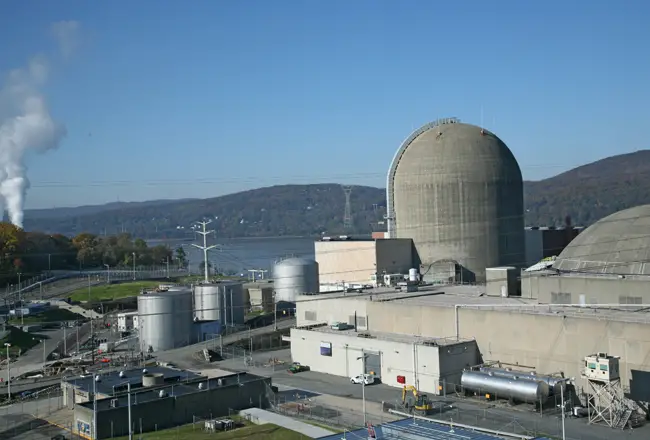As Indian Point Energy Center prepares to shut down in four years, and take with it a huge chunk of revenue for its surrounding municipalities and school district, both the state and town of Cortlandt will look to consultants to help prepare for life after the nuclear plant.

At the second meeting of the state”™s Indian Point Closure Task Force on Sept. 28, Cortlandt Town Supervisor Linda Puglisi said the town would hire an economic development consultant to identify development opportunities in town-owned and underutilized private land.
Representatives for the New York State Energy Research and Development Authority, meanwhile, announced at the same meeting that the state authority had hired D.L. English Consulting Inc., a South Dartmouth, Massachusetts-based firm focused on the energy industry, to lead a reuse study of the Indian Point property.
Puglisi told the Business Journal that the town is trying to be proactive in finding development that could replace the $800,000 per year its set to lose when Indian Point closes.
“Our planning department put together parcels that could be developed for new industrial, commercial, corporate park areas in the town,” Puglisi said. “We don”™t know how much of the 240 acres of Indian Point is going to be able to be reused in the near future.”
Indian Point owner and operator Entergy Corp. is expected to close the plant”™s Unit 2 reactor by April 2020 and its Unit 3 reactor by April 2021 under the terms of a legal settlement reached in January with the state and the environmental group Riverkeeper.
“We”™re looking at ways of bringing in new business to offset that loss of revenue,” Puglisi said.
The town board approved a resolution last month to publish a request for proposal for an economic development consultant. The firm would be retained for one year, likely for between $40,000 and $50,000 by Puglisi”™s estimates.
The firm will “help us market property that either the town owns or that is privately owned,” Puglisi said. “We could talk to the property owners to see if they are open to different types of businesses on their property.”
“I guess Amazon”™s not coming here,” Puglisi joked, but said possible new businesses the town would explore could include corporate office parks, recreational facilities such as an indoor skating rank or a hotel.
The town, Puglisi said, can pitch potential businesses and developers on access to transit through its Metro-North train station, available Hudson River acreage and low town taxes.
The land the town can explore for development include town-owned land on the Hudson River, including 100 acres in the village of Verplanck bought last year from Con Edison for $2.5 million. Add to that about 150 acres of private and town-owned vacant land in other parts of the town.
There”™s also, of course, the matter of Indian Point”™s 240 waterfront acres, owned by Entergy. While Puglisi said the town will explore possible uses for the land, officials still don”™t have a clear answer on whether any of it will be available for redevelopment.
“But if it can be used, or a part of that 240 acres can be used, we want to hit the ground running with possibilities,” Puglisi said.
NYSERDA, meanwhile, has contracted D.L. English Consulting for $350,000 to help the state”™s Indian Point closure task force with a study on potential reuses for Indian Point”™s land.
A NYSERDA spokesperson said the study will “develop facts and articulate options to facilitate decision making by stakeholders relative to reuse of the Indian Point site.”
The report will have sections on the property and its history, options for decommissioning, regulatory requirements and reuse options.
D.L. English Consulting representatives noted at the meeting the firm”™s 19 years focused especially on the nuclear industry. The project manager for the reuse study, Fred Petschauer, has worked in the past on the closing of Zion Nuclear Power Station in Illinois and was the resident manager for the decommissioning of the Shoreham Nuclear Power Plant on Long Island.
Petschauer said D.L. Consulting will work with Entergy to gather a range of data, including radiological conditions of the property, other hazardous materials, stored spent fuel stored and spill reports.
“We hope to paint a picture of Indian Point,” Petschauer said at the meeting. “Take the 240 acres and be able to divide into what we call impacted vs. nonimpacted.”
The final report from the state task force on reuse scenarios is due by the end of April 2018.
Westchester County Legislator Catherine Borgia, Democratic majority leader and representative of Cortlandt, said it”™s important the study look at economic development.
“We”™re going to have to have some strategic thinking on how we are going to use this property sooner rather than later,” Borgia said. “The economic development part has to be part of the report, not only the decommissioning process.
Borgia added that local representatives “need some oversight about exactly what we want to see happen on the property.”
David English, president of D.L. English Consulting, said at the meeting that the most important step is understanding the site conditions.
“Before we can say what”™s available, we have to know what”™s there,” English said.
“Ideally, with 240 acres, yes it would be great to parcel off segments of that facility for reuse,” English said. “Can it be done? We don’t know yet. That”™s what we are going to try to find out right away.”




















